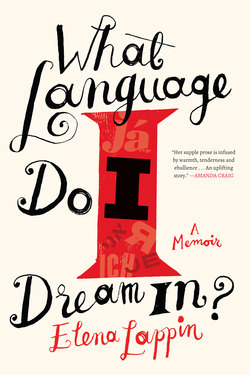Читать книгу What Language Do I Dream In? - Elena Lappin - Страница 8
На сайте Литреса книга снята с продажи.
Prologue
ОглавлениеIn July 2015 my father and I set out for a rare walk near my parents’ apartment in prague. They have lived in Germany since 1970, but for the last ten years or so they have been returning to this second home. My mother is content in either place, but my father is visibly happier in this city he has loved since he was a teenager.
Walking is very difficult for him now. He has a chronic pain in his back which is so severe he can only do a few steps at a time, leaning on his cane. Without it he still looks youthful, elegant and full of life. But when the pain gets the better of him he shows his real age – eighty-four – while he catches his breath and waits for his energy to return. It always does.
In Hamburg, he spends most of his time at home, sleeping in front of the TV. But in Prague he finds daily excuses for small errands he can run, places he can see, people he can visit. In Prague he is many years younger in spirit.
On this day – the eve of my return to London – my father announced: ‘Let’s go and buy those teaspoons you wanted. I know a shop.’ A long time ago I had said I needed more teaspoons; he remembered.
We made our way there very slowly, down cobbled streets, across busy roads. We took a bus, then a tram. Then, not far from our destination, my father said he needed a break, so we stopped off at an outdoor café.
‘Look,’ he said, pointing upwards. ‘This is the house.’
‘Which house?’
‘The one I lived in with my older brother and his wife when I first came here from Moscow.’
I knew, of course, that he had moved to Prague as a teenager in 1947 – his Czech still has a slight tinge of a Russian accent – but in all the years we lived there, when I was growing up, and later, when we came back for frequent visits, my father never mentioned his first Prague address. He always talked about those early times as if his history here had begun when he married my mother. But now he suddenly opened up.
‘Look,’ he said, pointing at a building across the street. ‘That’s where we bought our meat. And see that corner? We had a great tailor there. The day after I got here Grisha took me to buy two suits, because I had arrived with nothing.’
He looked around – at the traffic, the trams, the people . . . Taking it all in, he said: ‘It hasn’t really changed that much, you know. The day I saw this street for the first time was the moment I fell in love with Prague. I saw civilisation for the first time in my life. At home we didn’t even have an indoor toilet.’
Suddenly, he summoned the waiter and said he wanted to pay, right now. ‘Let’s go. I want to show you the apartment we lived in. It’s actually on this corner.’
And so we went there, slowly. It was a very nice art deco apartment building, in good condition. A young woman walked out of the front door just as we arrived; my father squeezed past her as if he had every right to enter. Then he stood in front of the lift, hesitating.
‘I’m not sure which floor it was,’ he said, clearly annoyed with himself. ‘I think . . . fourth. No, fifth. Yes, fifth.’ Stepping out of the lift on the fifth floor, he smiled, very happily: ‘There, that last door. That’s it. That was ours.’
‘What do you want to do now?’ I said.
‘I’ll ring the bell and tell them I used to live here, of course.
What else?’
‘OK.’
The old man, my father, gathered up all his strength, and with a real twinkle in his eye walked up to a stranger’s door and pressed their bell button. I took a photo of him standing there, slightly bent but still full of his strong character. He looked dignified, excited, but also a little sad. Or maybe the sadness was all mine.
No one answered. He rang again. Nothing.
He was disappointed. ‘I really wanted to show you a slice of my youth,’ he said. ‘But never mind. Let’s go and get those teaspoons.’
The lift door was still open. On the way down I asked a question about the apartment, what it was like. And what was Prague like, in 1947?
‘Stop it,’ he said brusquely. ‘You know I don’t want to talk about these things.’
